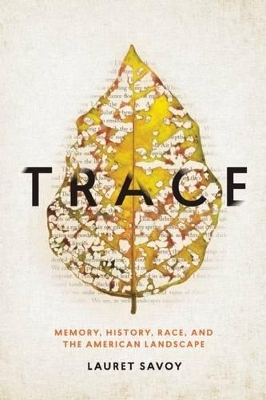
Trace
Memory, History, Race, and the American Landscape
Seiten
2016
Counterpoint (Verlag)
978-1-61902-825-8 (ISBN)
Counterpoint (Verlag)
978-1-61902-825-8 (ISBN)
- Lieferbar (Termin unbekannt)
- Versandkostenfrei innerhalb Deutschlands
- Auch auf Rechnung
- Verfügbarkeit in der Filiale vor Ort prüfen
- Artikel merken
With a New Preface by the Author
Through personal journeys and historical inquiry, this PEN Literary Award finalist explores how America's still unfolding history and ideas of "race" have marked its people and the land.
Sand and stone are Earth's fragmented memory. Each of us, too, is a landscape inscribed by memory and loss. One life-defining lesson Lauret Savoy learned as a young girl was this: the American land did not hate. As an educator and Earth historian, she has tracked the continent's past from the relics of deep time; but the paths of ancestors toward her-paths of free and enslaved Africans, colonists from Europe, and peoples indigenous to this land-lie largely eroded and lost.
A provocative and powerful mosaic that ranges across a continent and across time, from twisted terrain within the San Andreas Fault zone to a South Carolina plantation, from national parks to burial grounds, from "Indian Territory" and the U.S.-Mexico Border to the U.S. capital, Trace grapples with a searing national history to reveal the often unvoiced presence of the past.
In distinctive and illuminating prose that is attentive to the rhythms of language and landscapes, she weaves together human stories of migration, silence, and displacement, as epic as the continent they survey, with uplifted mountains, braided streams, and eroded canyons. Gifted with this manifold vision, and graced by a scientific and lyrical diligence, she delves through fragmented histories-natural, personal, cultural-to find shadowy outlines of other stories of place in America.
"Every landscape is an accumulation," reads one epigraph. "Life must be lived amidst that which was made before." Courageously and masterfully, Lauret Savoy does so in this beautiful book: she lives there, making sense of this land and its troubled past, reconciling what it means to inhabit terrains of memory-and to be one.
Through personal journeys and historical inquiry, this PEN Literary Award finalist explores how America's still unfolding history and ideas of "race" have marked its people and the land.
Sand and stone are Earth's fragmented memory. Each of us, too, is a landscape inscribed by memory and loss. One life-defining lesson Lauret Savoy learned as a young girl was this: the American land did not hate. As an educator and Earth historian, she has tracked the continent's past from the relics of deep time; but the paths of ancestors toward her-paths of free and enslaved Africans, colonists from Europe, and peoples indigenous to this land-lie largely eroded and lost.
A provocative and powerful mosaic that ranges across a continent and across time, from twisted terrain within the San Andreas Fault zone to a South Carolina plantation, from national parks to burial grounds, from "Indian Territory" and the U.S.-Mexico Border to the U.S. capital, Trace grapples with a searing national history to reveal the often unvoiced presence of the past.
In distinctive and illuminating prose that is attentive to the rhythms of language and landscapes, she weaves together human stories of migration, silence, and displacement, as epic as the continent they survey, with uplifted mountains, braided streams, and eroded canyons. Gifted with this manifold vision, and graced by a scientific and lyrical diligence, she delves through fragmented histories-natural, personal, cultural-to find shadowy outlines of other stories of place in America.
"Every landscape is an accumulation," reads one epigraph. "Life must be lived amidst that which was made before." Courageously and masterfully, Lauret Savoy does so in this beautiful book: she lives there, making sense of this land and its troubled past, reconciling what it means to inhabit terrains of memory-and to be one.
LAURET SAVOY is a woman of African American, Euro-American, and Indigenous ancestry, and the David B. Truman Professor of Environmental Studies & Geology at Mount Holyoke College, where she explores the stories we tell of the American land's origins and the stories we tell of ourselves in this land. Her books include The Colors of Nature: Culture, Identity and the Natural World; Bedrock: Writers on the Wonders of Geology; and Living with the Changing California Coast.
| Erscheinungsdatum | 19.08.2016 |
|---|---|
| Verlagsort | Berkeley |
| Sprache | englisch |
| Maße | 140 x 209 mm |
| Gewicht | 261 g |
| Themenwelt | Reisen ► Reiseberichte ► Nord- / Mittelamerika |
| Geisteswissenschaften ► Geschichte ► Regional- / Ländergeschichte | |
| Geschichte ► Teilgebiete der Geschichte ► Kulturgeschichte | |
| Naturwissenschaften ► Geowissenschaften ► Geografie / Kartografie | |
| Sozialwissenschaften ► Ethnologie | |
| Sozialwissenschaften ► Soziologie ► Makrosoziologie | |
| ISBN-10 | 1-61902-825-5 / 1619028255 |
| ISBN-13 | 978-1-61902-825-8 / 9781619028258 |
| Zustand | Neuware |
| Haben Sie eine Frage zum Produkt? |
Mehr entdecken
aus dem Bereich
aus dem Bereich
der stille Abschied vom bäuerlichen Leben in Deutschland
Buch | Hardcover (2023)
C.H.Beck (Verlag)
23,00 €
vom Mittelalter bis zur Gegenwart
Buch | Softcover (2024)
C.H.Beck (Verlag)
12,00 €
Die Revolution des Gemeinen Mannes
Buch | Softcover (2024)
C.H.Beck (Verlag)
12,00 €


